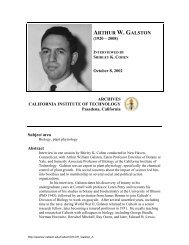Interview with Thomas A. Tombrello - Caltech Oral Histories
Interview with Thomas A. Tombrello - Caltech Oral Histories
Interview with Thomas A. Tombrello - Caltech Oral Histories
Create successful ePaper yourself
Turn your PDF publications into a flip-book with our unique Google optimized e-Paper software.
<strong>Tombrello</strong>–145<br />
ASPATURIAN: Really?<br />
TOMBRELLO: Koonin had opinions, and he didn’t mind telling you what they were. Remember,<br />
he was a teenage protégé of mine, and maybe he got some of the wrong lessons. One was to be a<br />
bit of a dilettante in science and do a lot of different things. And the other is sometimes to tell<br />
people things they don’t want to hear.<br />
ASPATURIAN: Are you comfortable giving a couple of examples?<br />
TOMBRELLO: See, I’ve never had any trouble <strong>with</strong> him, but he clearly had not treated Zewail<br />
<strong>with</strong> quite the respect that Ahmed wanted. Again, Koonin had not done any administrative stuff,<br />
and he was thrown into the provost’s job. He made some mistakes by offending people,<br />
basically by shooting from the hip on a few things. I was willing to excuse it. After all, he’d<br />
been my student. I’d gotten him back here. I had kept him from getting away; I told that story.<br />
To jump ahead just a little bit, when I had an interview <strong>with</strong> David Baltimore about becoming<br />
division chair of PMA, he said, “Well, Koonin was your undergraduate student and then your<br />
colleague. How do you feel about working for him?” I said, “Would ‘proud’ be a good<br />
adjective?” That finished the conversation. I said, “I have no problems.” Koonin and I have<br />
had our disagreements. Haven’t we all? I said, “But I think, you know, I think I can work <strong>with</strong><br />
him. Will it always be smooth? Why should it always be smooth?”<br />
Turned out it was exceedingly smooth. I’ll give an example: He was chosen provost in<br />
1995, and I got chosen as division chair in ’98. I got in just before the beginning of a new fiscal<br />
year—I believe, the first of August in 1998. I discovered that the budget for the next year had<br />
been completely committed. I had discretionary money, as division chair of a big division, of<br />
$19,000. My predecessor, Charlie Peck, had committed it all, and I wasn’t entirely happy <strong>with</strong><br />
the way it had been committed. So I cried foul to Koonin. [See also Session 8] Koonin looks at<br />
me <strong>with</strong> a twinkle in his eye and says, “You’re really good <strong>with</strong> money, Tom. Let’s just say this<br />
is a challenge for you.” I said, “Well, Steve, I’m willing to take that challenge.” I said, “I don’t<br />
think anybody should look at the books very carefully. And <strong>with</strong> the current financial system,<br />
you really can’t. It won’t be illegal, but I’ll get through the year <strong>with</strong> $19,000 of discretionary<br />
money.” He just laughed. To make a long story short, I finished the year <strong>with</strong> a surplus, small.<br />
I got a lot of things done. I renormalized expectations in the division. The next year Koonin<br />
http://resolver.caltech.edu/<strong>Caltech</strong>OH:OH_<strong>Tombrello</strong>_T

















